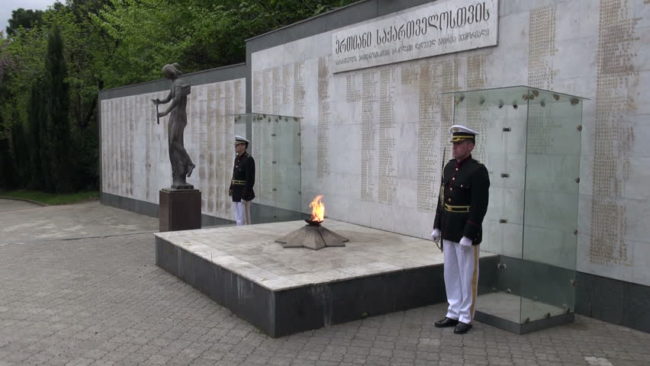

 Giorgi Tomadze, a fourth year student at Tbilisi State University, has just been conscripted by the Ministry of Corrections. He finds the idea of military service honourable, but only in theory. In practice, he is not looking forward to working ‘as a prison guard for a whole year with only a 10-day training course during which he will fire six bullets’ — enough to ‘qualify’ him as a marksman and a warden.
Giorgi Tomadze, a fourth year student at Tbilisi State University, has just been conscripted by the Ministry of Corrections. He finds the idea of military service honourable, but only in theory. In practice, he is not looking forward to working ‘as a prison guard for a whole year with only a 10-day training course during which he will fire six bullets’ — enough to ‘qualify’ him as a marksman and a warden.
Tomadze, who was planning to apply for a Masters, is now worried that he will simply lose a year of his life. He claims that many of his peers who cannot afford to pay the ₾2,000 ($775) fee required to defer service for 18 months seek to avoid conscription at any cost, including through self-harm. There are no official statistics on this.
Abolished and then reinstated
On 14 February, Georgia reinstated mandatory military service, after it was abolished less than a year ago by the previous government.
At a meeting with journalists, Georgia’s new defence minister, Levan Izoria, claimed that military conscription was necessary for a country such as Georgia and promised to improve soldiers’ living conditions. He added that a fully professional military was too costly for the government.
On 27 June 2016, compulsory military service was abolished by Izoria’s predecessor and Georgia’s first female defence minister, Tina Khidasheli. At the time, her decision was met with scepticism even among her own allies. Prime Minister Giorgi Kvirikashvili argued that the decision — although possibly part of a long-term strategy — was shortsighted and untimely.
In fact, Khidasheli was only able to apply her decision to the Ministry of Defence, which covered 25% of recruits. Other agencies, such as the Ministry of Corrections and Ministry of Interior, remained unaffected.
‘As Defence Minister, I can make this decision unilaterally’ — argued Khidasheli at the time, although she acknowledged that anyone could easily reverse the decision in future.
Khidasheli’s move to hastily revoke the draft may be politically motivated. She made the decision two months before Georgia’s parliamentary elections, just prior to which her own Republican party left the ruling Georgian Dream coalition.
According to the current rules, all men aged 18–27 are subject to the compulsory draft. There are, exceptions for men who declared unfit due to health reasons, men convicted of serious crimes, as well as only sons in families where at least one relative died while ‘fighting for Georgia’s territorial integrity’. The prime minister also has the authority to release recruits from military service if they have ‘special talent’.
‘A wasted year’
Twenty-three-year-old Nugzar Khabelashvili works for the University Security Service to pay his tuition fees. He argues that if he joins the army, the only difference will be that his service will be unpaid.
‘My friends are in the army now and they have countless problems. They don’t have enough food and they have only one uniform for the whole year. All of this makes young people lose their motivation’, Khabelashvili says.
When asked if military service should be mandatory, he argues that people who are forcibly drafted can be traumatised, which will have negative effects for the state in the long run.
Lasha Shakulashvili, a PhD student at Tbilisi State University, wanted to join the army as a means of professional advancement. He thought that the majority of successful people working in international relations had military experience. However, he quickly became disillusioned.
‘When I understood that in Georgia, military service means standing on guard in front of some building, I started to avoid it so as not to waste my time. I did my best not to work as a guard. It’s terrible when you go to the military commission and they tell you to leave your job and instead work somewhere as a guard’, Shakulashvili said. ‘The worst thing is when they interfere with your personal life. In some cases they call your parents. How can they do this when they’re dealing with an adult?’
Drafted by all possible means
One respondent told OC Media that by trying to draft young people by all possible means the army sometimes violates the law, for example by disregarding exemptions for men medically unfit to serve. The system also breeds corruption. Akaki Jikashvili was first called to join the army in 2014, although he never had an interest in doing so. He stood before the draft commission with 50 other young men. According to him, only a few of them were drafted — the rest were allowed to go home after paying bribes.
‘Some people paid ₾200 ($75) as a bribe and were exempted from service. Three members of the military commission were later arrested for this. I didn’t have that kind of money and despite my innate foot defect, I was still drafted’, Jikashvili said. ‘I underwent foot surgery and after a month, even though I wasn’t allowed to wear heavy boots, they made me stand for extended periods of time on duty as a guard.’
According to a study conducted by NDI, in 2013, 63% of respondents supported the initiative to abolish compulsory military service and to introduce a professional army, while 26% opposed such a move.
The Ministry of Regional Development and Infrastructure, which is in charge of the draft process, told OC Media that according to the most recent government resolution on conscription, which was adopted on 3 February, in 2017, 422 recruits will be drafted to the State Security Service, 865 to the Interior Ministry, 1,400 to the Defence Ministry, and 1,000 to the Ministry of Corrections.








